Preston's Sue Ryder Centre gives manager Lee a second chance after stroke at 47
and live on Freeview channel 276
An “amazing and life changing” centre in Preston was today credited by Lee Atkinson with giving him a second chance.
The 47 year old stroke survivor has paid glowing tribute to the rehabilitation team at the new Sue Ryder Neurological Care Centre.
Advertisement
Hide AdAdvertisement
Hide AdThrough the long early months of the Covid pandemic they worked to help manager Lee get back on his feet.
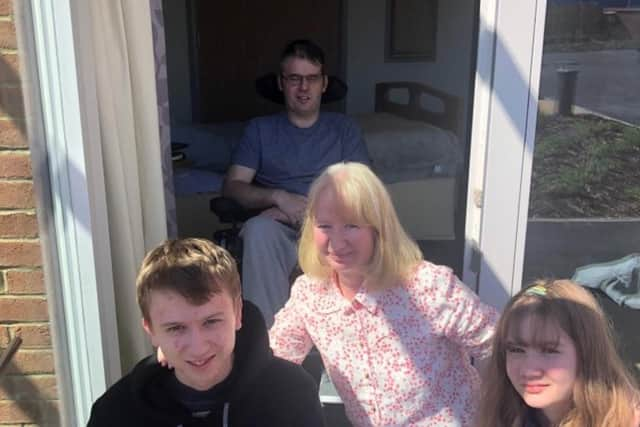

He is one of its rehabilitation unit's first success stories and he credits the centre, which opened in spring 2020, with giving him both help and hope.
Through the long early months of the Covid pandemic its multidisciplinary team worked to help manager Lee get back on his feet.
Lee , a manager with national car servicing and repair chain Kwik Fit,spent four months in the rehabilitation unit at the state of the art centre in Fulwood.
Advertisement
Hide AdAdvertisement
Hide AdHe said: “Basically I was lucky enough to get a placement to go to the centre. From my experience it was life changing for me. I was on a stretcher. I ended up going to the rehabilitation unit and ended up walking out of there. I really appreciate what they’ve done for me. It was amazing.”
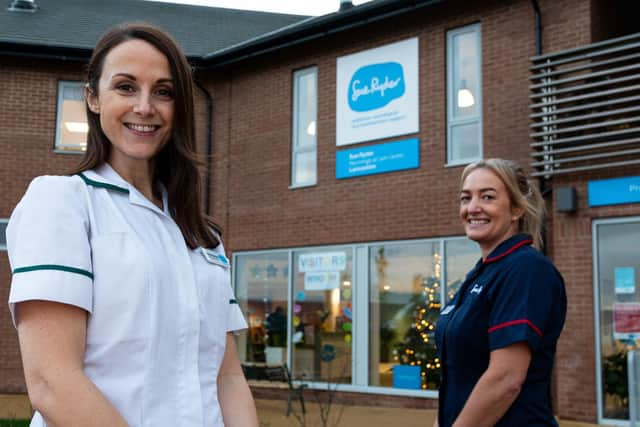

Lee had been treated in the Royal Preston Hospital after collapsing at his home in Cumbria. He was in RPH for five weeks where he had three operations, before moving to the brand new centre for rehabilitation therapy.
Prior to his collapse he said he had known he felt unwell and had headaches. He visited his GP who referred him for a scan. But nothing amiss was found at his local hospital and he was sent home. His wife Petra, a children’s nurse, also 48, had been working a night shift and on returning home discovered her husband collapsed in the bathroom.
He said: “It has been life changing for me and my family. It was a bit of a shock .. I was quite an active person. It was a stroke. I remember waking up from being active to being paralysed and not able to walk on my left side and my speech wasn’t amazing and obviously cognitive issues weren’t so good. It’s just one of those things that happen in your life. I’m just fortunate I’ve been given a second opportunity.”
Advertisement
Hide AdAdvertisement
Hide AdHe said: “Occupational therapy, speech ,therapy, physio, psychology ... I got a lot of treatment. Techniques to get me back on my feet again. My left side was weak so they helped me get strength in my legs. The team was fantastic. For me to walk again was the main thing. To be given that was amazing, because I didn’t really appreciate being able to walk, but then you have to re-learn and have the right team there to show you and help you achieve it."
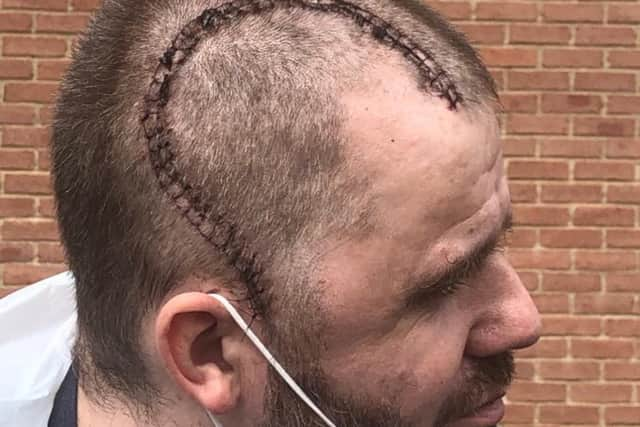

He continued: “To be able to achieve normal things even down to washing and dressing it was amazing. For me it was highly emotional that I couldn’t do things. I did a lot of therapy. Washing and dressing took me four weeks.”
Lee’s collapse came at the start of the Covid epidemic so his family could not visit him for many, many weeks. The combination of not seeing his family, the operations he needed and sudden disability brought his spirits low. He said the Sue Ryder team stepped up to help here too.
He said: “I did suffer a bit of depression. It was emotional for me, but they supported me through that. I wasn’t the best patient. I was quite difficult I suppose. They really helped me. I was possibly a little bit demanding.”
Advertisement
Hide AdAdvertisement
Hide AdHe added: “It ‘enhanced’ my emotional side as well, which I didn’t really believe I had. I would be waking up getting upset in the morning and unhappy. I was supported - that was good. My personal goal was to try to get back to working and support my family.”
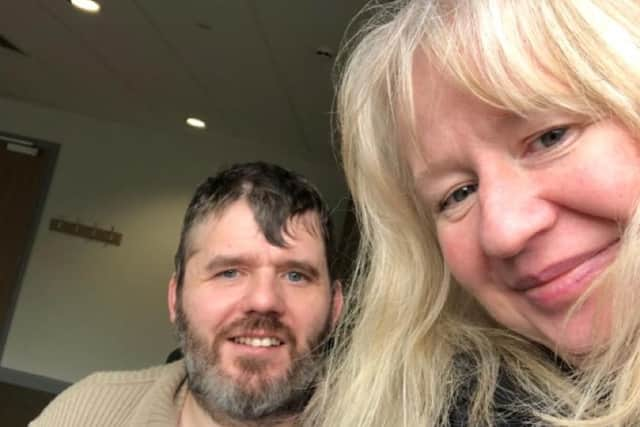

Now Lee is looking forward to a return to work, possibly in the spring. He says he will not be able to go back to his role as manager of the Barrow-in-Furness branch of Kwik Fit, but is proud to have trained his apprentice to take his role and hopes a new role can be found for him. He said: “I won’t be doing the exact same job I was doing, maybe I’ll be on the floor, doing something in the workshop possibly.”
Knowing of his interest in motorbikes the Sue Ryder therapy team gave him word searches to do featuring bike vocabulary and he was helped to make and colour a special model of a bike. Music helped in his recuperation too and he was guided to visualise and imagine taking a bike to bits and rebuilding it.
He had a splint to help as he relearned use of his left hand and needed a safety helmet to protect his head, prior to having a titanium plate fitted after part of his scalp had to be removed. When he was leaving he asked Sue Ryder staff to sign his safety helmet.
Advertisement
Hide AdAdvertisement
Hide AdHe said: “: “Then it’s really the small things. The little things. You appreciate stuff ...even like the helmet I was given. I was told a lot of times to put it back on! I’ve kept the splint and helmet as a momento. I’ve got them to look at and remind me and to understand and appreciate I’ve been given a second chance. I appreciate that.”
Wife Petra and children Oliver 18 and Leah 13 supported him through his recovery.
Success stories like Lee’s are something staff at the centre never take for granted. Each client needs a person centred approach and it is, stresses Hannah Halliwell, Head of Therapy Services, a multidisciplinary approach with team members working together to help patients achieve their best possible outcome.
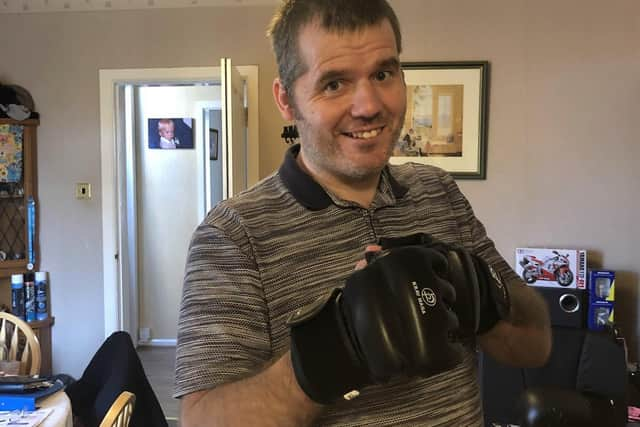

Their role demands they help towards rebuilding not just client’s bodies but their mind and spirit too.
Advertisement
Hide AdAdvertisement
Hide AdHannah, formerly an NHS occupational therapist and manager took up her role as head of therapy services after working for an NHS Trust in Manchester. She was recruited with a first task to “support the charity to bring to life the vision of the new rehabilitation offer.”
She says the £12m centre has a “highly multidisciplinary” and holistic approach and it includes all staff 24 hours a day, seven days a week.
While the Sue Ryder centre in its previous location at Cuerden provided complex neurological care to residents with long term neurological conditions, the new centre continues this work but has its ground floor devoted to rehabilitation, with assets such as a hydrotherapy pool, a special rehab kitchen, a de-weighing treadmill system , which helps people relearn walking skills and four “stepping stone” assisted living bungalow units. There are 14 individual bedrooms, each with en suite facilities in the rehabilitation unit.
Virtual reality equipment also helps the shorter stay rehabilitation residents, lifting their mood and helping them to experience a flavour of activities such as being transported to the Northern Lights or scuba diving.
Advertisement
Hide AdAdvertisement
Hide AdHannah says the centre looks outwards too to create close alliances with NHS partners. Rehabilitation patients are often transferred from acute care within the NHS to a rehabilitation phase with Sue Ryder.
She said: “I oversee all referral activity that comes through the centre. We make a team decision as to the referrals we can support. The majority of our patients are referred to us from our closest hospital (Royal Preston) but clients could be from anywhere in the north west. We do get referrals from Cumbria, Blackpool and across Lancashire.”
In the future, once Covid restrictions ease, visitors to the centre will be able to use a new ground floor cafe at the Teal Avenue centre and it is hoped to build closer links with the community.
.